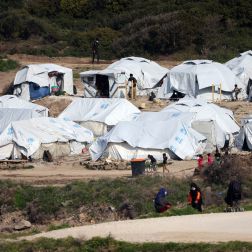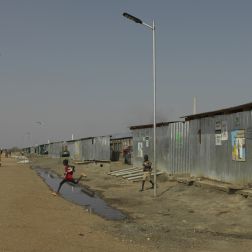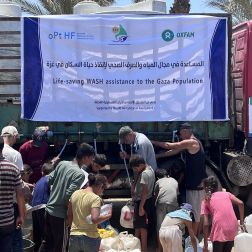- 4 mins read time
- Published: 15th July 2020
Between war and coronavirus, the double crisis for Syrians is too much to bear

By Dania Kareh, Media and Communications Officer, Oxfam in Syria
Edited by Roslyn Boatman, MENA Regional Media and Communications Advisor
“I often wonder what childhood memory my kids will take with them when they are grown? Is it the memory of piles of rubble they stumbled over so many times on their way to school? The nights they had to go to bed with empty stomachs? Or memories of our destroyed neighborhood? All of it will be a reminder of a happy childhood they should have had, but didn’t,” says Louay, a 45-year-old father of four, close to tears.
Louay and his family live in Hamouriyeh, an agricultural town in Rural Damascus, once home to nearly 14,000 people who suffered through several years of brutal war and displacement.
“We haven’t been able to have a normal life during nine years of violence and now the coronavirus crisis is exacerbating all of the other issues we had before it came. This is too much to bear.”

The difficulty of living in a double crisis
Even before coronavirus hit, four out of five Syrians lived below the poverty line. For millions, the almost decade-long war has been a time of fear, confusion and huge loss; of livelihoods and belongings, homes and family members and, for too many, the loss of dreams.
Now, the coronavirus has brought a double humanitarian crisis to Syria, bringing even greater challenges to people’s lives and pushing them into extreme measures of survival.
Louay says that to cope, his family has had to cut back on the number of meals they eat each day.
“I’ve worked as a carpenter ever since I was a boy. It was once a thriving business, but not anymore. Since the war began, and now with coronavirus, things went from bad to worse. Who would think about buying furniture now with the increased prices, when most households can't even afford their basic living expenses? People cannot afford to buy items unless they are daily essentials.
“When costs are increasing, you buy fewer things. We need to forget things like meat and fruit now.” Louay turned to farming to help make ends meet. He owns a small plot of land and by planting a part of it, he hopes that he will give his family some returns by the end of the season.

Livelihoods gripped by the pandemic
For Marwan, a farmer from Rural Damascus, the situation is no different
“Two months ago, we started to feel the impact of the coronavirus crisis. Our income was dwindling, and food prices continued to skyrocket. What we earned from last season’s harvest couldn’t cover my family’s basic expenses, even rent, and setting some money aside was something we could no longer do. Purchasing new seeds, after prices have increased dramatically, was out of the question, and so, for us, preparing for next season’s harvest was out of reach,” he told Oxfam.
Marwan lost his house during the violence and is now leasing an apartment with his family. Rent is expensive, and as prices continue to rise, his livelihood, like so many others, is at stake.

Millions of Syrians need humanitarian assistance
Oxfam has delivered chickens, tomato and aubergine seedlings, and cucumber and courgette seeds to around 2,200 people in eastern Ghouta. For Marwan, the seedlings and seeds have saved his family. “Without them, our only option would have been to sell some of our land to survive,” he says.
All over the country, the situation for Syrians is sharply deteriorating. Millions of Syrians like Marwan and Louay need humanitarian assistance for clean water, food, shelter, healthcare and more. For hundreds of thousands of families, it is life-saving. It is vital that families across Syria continue to receive the assistance they need.
Without access to this crucial aid, thousands more will be forced to abandon their livelihoods, bringing them closer to financial ruin. We must ensure we do everything we can to ensure Syrians are protected and supported, otherwise dignified and safe lives will fall further from their grasp.

This disease knows no borders and does not discriminate. For the world’s poorest and most vulnerable, the worst is yet to come as the coronavirus begins to establish itself and spread quickly through communities powerless to stop it, without access to water, sanitation or healthcare.
Together, we can save lives.




